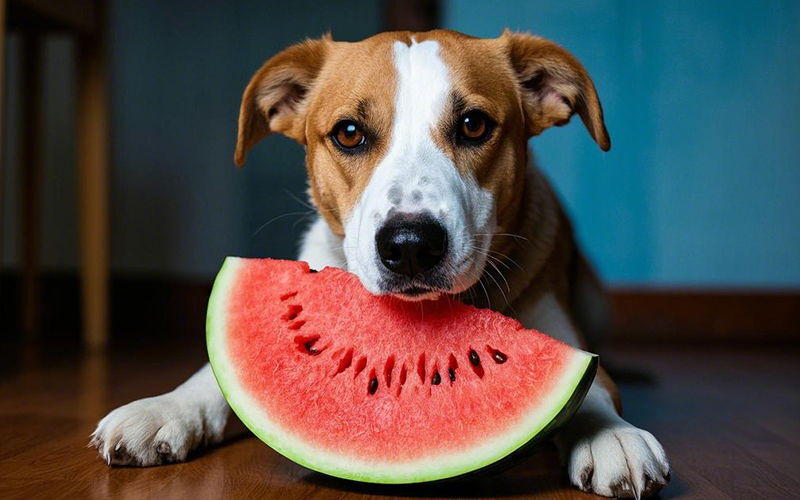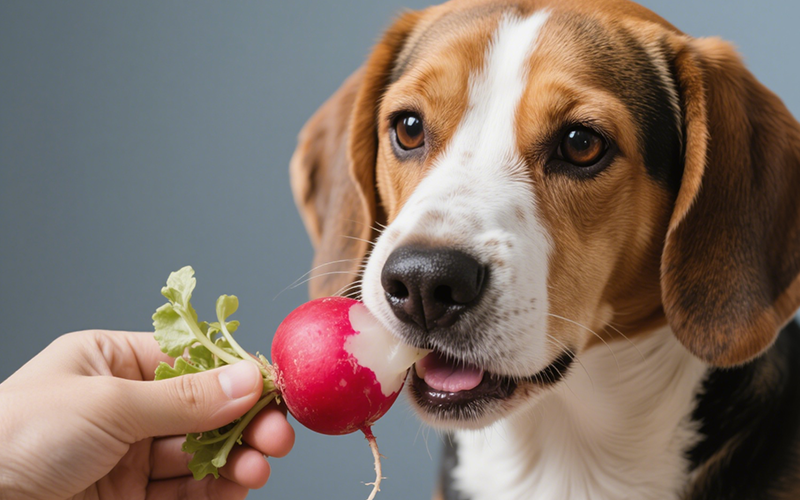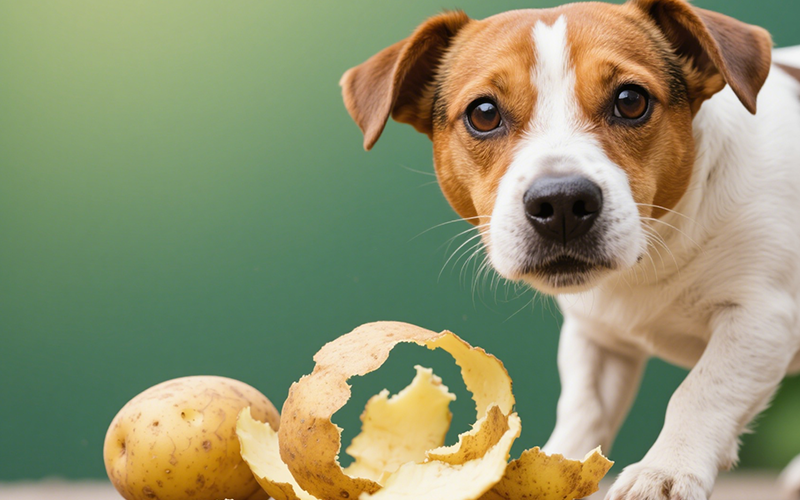Can Dogs Eat Watermelon? A Refreshing Summer Treat for Your Pup!
- 7 Mar 2025 10:07
Watermelon is a popular fruit that’s juicy, sweet, and hydrating—perfect for a hot summer day. As a dog owner, you might find yourself wondering, "Can dogs eat watermelon?" After all, it's a healthy, hydrating fruit for humans, so surely it would be safe for your dog too, right? Let’s dive into the details and explore whether watermelon is a good treat for your furry friend! 🐾🍉

Is Watermelon Safe for Dogs to Eat? ✅
Yes, dogs can eat watermelon! It is generally safe for dogs to enjoy watermelon, but there are a few precautions you need to take to ensure that your pup stays healthy and safe while indulging in this fruity treat.
Watermelon is not only delicious but also low in calories, making it a healthy snack for dogs, especially during warm months when they need hydration. However, like with any treat, moderation and proper preparation are key.
1. Nutritional Benefits of Watermelon for Dogs 🍉💪
Watermelon isn’t just tasty, it’s also packed with beneficial nutrients for your dog! Here are some of the key benefits:
1.1 Hydration 💦
Watermelon is made up of about 92% water, which makes it an excellent source of hydration for your dog, especially on hot summer days. If your dog is reluctant to drink water, offering some watermelon can help keep them hydrated.
1.2 Vitamins and Antioxidants 🌟
Watermelon is a rich source of vitamin C and vitamin A, which are both essential for maintaining a strong immune system, healthy skin, and good eyesight. It also contains lycopene, a powerful antioxidant that may help reduce the risk of certain diseases.
1.3 Low in Calories 🐾
Watermelon is a low-calorie fruit, making it a guilt-free snack for dogs who are watching their weight or need a low-calorie option for treats. It's great for rewarding your dog without worrying about excessive calories.
2. How to Safely Serve Watermelon to Dogs 🐾🍉
While watermelon can be a great snack for your dog, it’s important to serve it in a safe and proper way to avoid any potential hazards. Here are a few tips:
2.1 Remove the Seeds 🚫
Watermelon seeds are not toxic to dogs, but they can pose a choking hazard or cause digestive issues, especially if your dog eats a lot of them. Make sure to remove all seeds before offering watermelon to your dog.
2.2 Avoid the Rind 🥒
The rind (the tough outer skin of the watermelon) should be avoided. It can be difficult for dogs to digest and may cause stomach upset or blockages if consumed. Only give your dog the soft, red, fleshy part of the watermelon.
2.3 Cut Into Small Pieces 🍉
Cut the watermelon into small, bite-sized pieces that are easy for your dog to chew and swallow. This will reduce the risk of choking and make it easier for your dog to enjoy their treat.
3. Potential Risks of Feeding Watermelon to Dogs ⚠️
While watermelon is generally safe for dogs, there are a few things to keep in mind to avoid any issues:
3.1 Upset Stomach 🤢
Watermelon is high in fiber, and giving your dog too much can lead to gas, bloating, or an upset stomach. Always start with a small amount to see how your dog reacts, especially if it’s their first time eating watermelon.
3.2 Choking Hazard from Seeds 😮
As mentioned earlier, watermelon seeds can be a choking hazard, especially for smaller dogs. Be sure to remove all the seeds before offering watermelon to your dog. If your dog accidentally eats a seed, don’t panic—it’s not usually harmful, but it’s best to avoid them.
3.3 Sugar Content 🍬
Watermelon is naturally sweet and contains sugar. While this is not harmful in moderation, feeding your dog too much watermelon can contribute to an unhealthy spike in sugar levels or even cause weight gain. Limit the amount of watermelon to small portions to keep your dog’s diet balanced.
4. How Much Watermelon Should You Give Your Dog? 🍉⚖️
While watermelon is a healthy and hydrating treat, it should only be given in moderation. Here’s a general guideline based on your dog’s size:
Small dogs (under 10 lbs): Offer a few small pieces (1-2 bite-sized pieces).
Medium dogs (10-30 lbs): Give them a handful of small pieces (3-4 pieces).
Large dogs (over 30 lbs): A couple of handfuls (5-6 small pieces).
It’s always a good idea to start with small amounts and see how your dog’s digestive system handles it. Remember, watermelon should be considered a treat and not a main part of their diet.
5. Other Fruits That Are Safe for Dogs 🍏🍓
If you’re looking for other healthy fruit options for your dog, here are some that are safe and nutritious:
Apples: Remove the seeds and core before offering small slices to your dog.
Blueberries: A great antioxidant-packed snack that’s perfect for training rewards.
Strawberries: High in fiber and vitamin C, just remove the stems.
Bananas: Rich in potassium, perfect for a low-calorie snack.
These fruits, like watermelon, provide health benefits and are a refreshing way to treat your dog.
6. When to Avoid Giving Your Dog Watermelon 🚫🍉
While watermelon is safe for most dogs, there are a few situations where you should avoid feeding it to them:
Dogs with diabetes: Due to the natural sugars in watermelon, it might not be suitable for dogs with diabetes. Always check with your vet if your dog has any specific health concerns.
Sensitive stomachs: If your dog has a history of stomach issues or a sensitive digestive system, it’s best to introduce watermelon gradually and watch for any signs of upset.
Choking hazard concerns: If your dog is known to gulp food quickly, they might be at a higher risk for choking. In this case, avoid watermelon or cut it into very small pieces.
Conclusion: Can Dogs Eat Watermelon? 🍉🐾
In summary, yes, dogs can safely eat watermelon in moderation. It’s a hydrating, nutritious treat that can be a refreshing snack for your dog, especially during warm weather. Just remember to remove the seeds and rind, serve it in small pieces, and keep an eye on portion sizes to avoid digestive issues.
If you’re ever unsure about introducing a new food to your dog or have concerns about their diet, consider using PettureX, an AI-powered pet health software. PettureX provides 24/7 online consultation and even pet image recognition to help answer your questions and provide real-time advice on your pet’s health. It’s a helpful and friendly tool to ensure your dog’s health is always top-notch! 🐕💻
Stay safe and hydrated, and enjoy those watermelon moments with your furry friend! 🍉🐶
Related

Radish Bites for Your Buddy? A Vet-Reviewed Guide on Whether Dogs Can Eat Radishes
- 22 Apr 2025
Potato Peels for Pooches? Unpeeling the Risks and Facts for Dog Owners
- 22 Apr 2025
Crunchy Curiosity: Can Dogs Safely Snack on Pork Rinds? A Deep Dive
- 21 Apr 2025
Pomegranate Seeds and Pooches: A Deep Dive into Whether Dogs Can Safely Indulge
- 21 Apr 2025
Can Dogs Eat Peaches? Vet Explains Benefits, Cyanide Risks & Safe Serving
- 16 Apr 2025
Can Dogs Eat Mulberries? Vet Explains Safety, Benefits & Potential Risks
- 16 Apr 2025
Can Dogs Eat Mozzarella? Vet Explains the Cheesy Truth (Risks & Benefits)
- 16 Apr 2025
Can Dogs Eat Maple Syrup? The Sugary Truth & Why Vets Advise Against It
- 16 Apr 2025
Can Dogs Eat Mango Skin? Vet Explains Why It's a Risky Chew!
- 16 Apr 2025
Can Dogs Eat Mac n Cheese? Vet Explains Why This Comfort Food Is Unsafe!
- 16 Apr 2025
